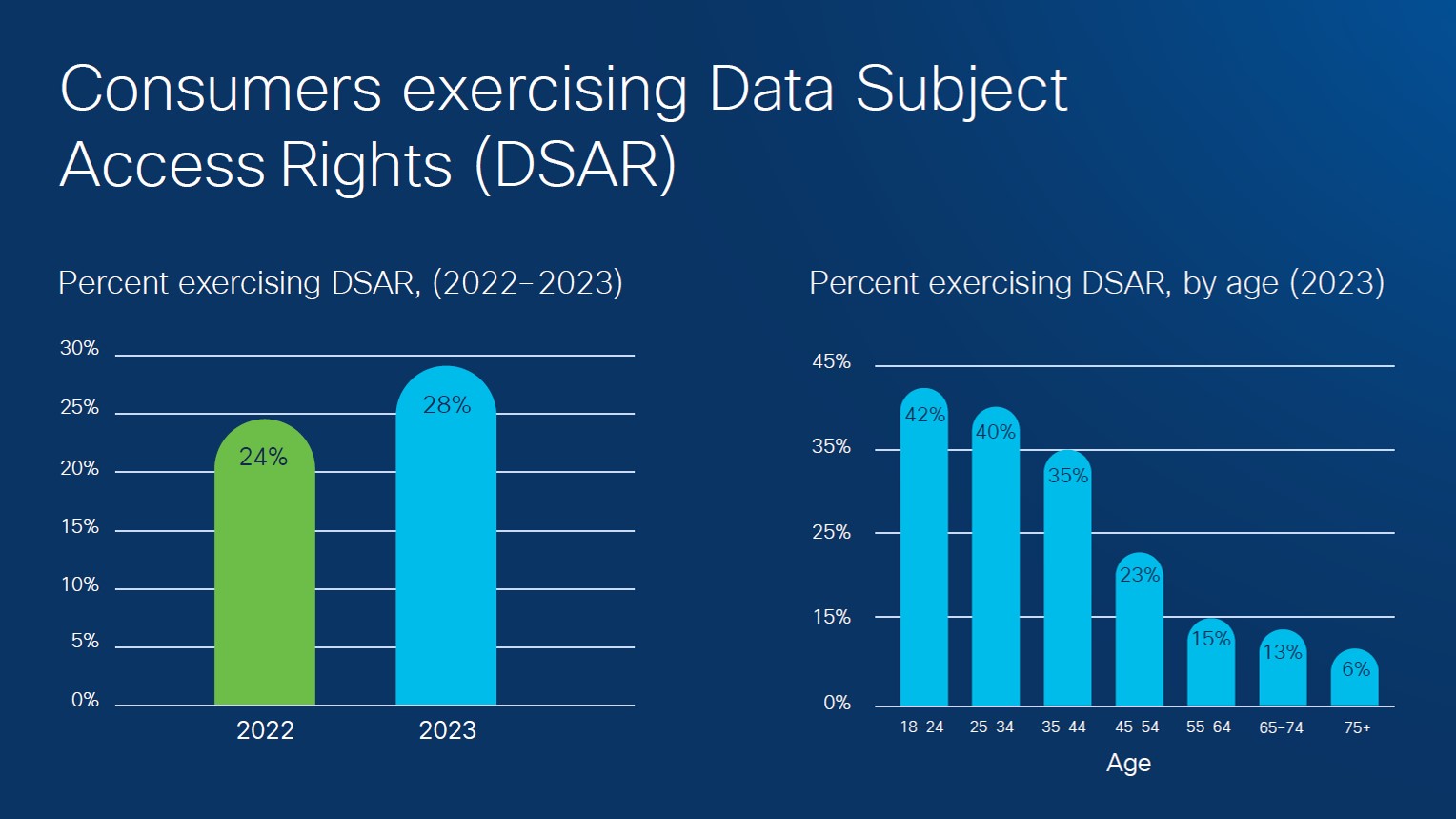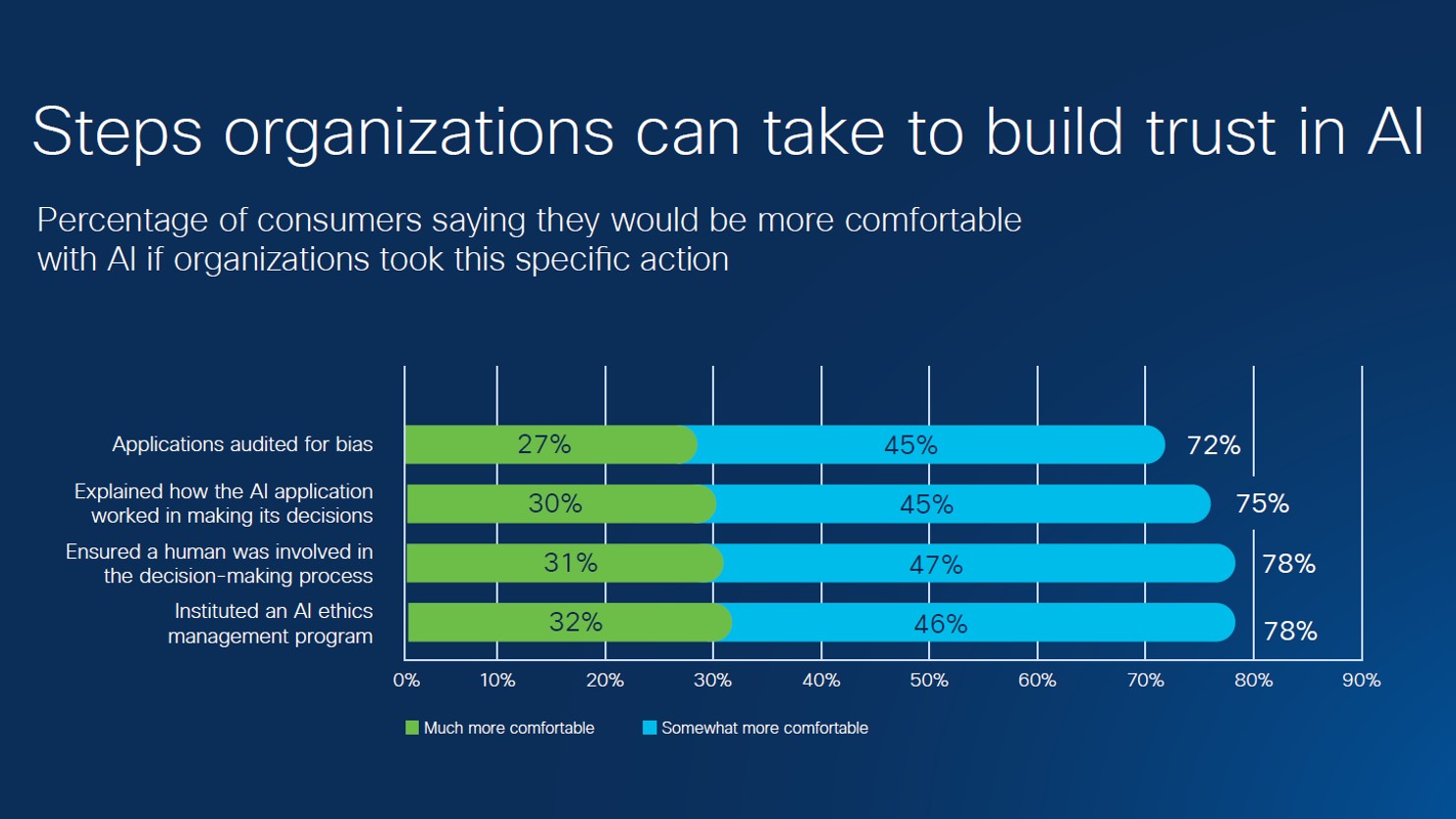
- The Cisco 2023 Consumer Privacy Survey, reveals that younger consumers are taking action to protect their privacy: 42% of consumers aged 18-24 have inquired about the personal data organizations have about them, seven times more than consumers aged 75 or older (6%).
- Consumers are concerned about their privacy in relation to Artificial Intelligence: 60% have lost trust in organizations due to their AI use. Businesses can implement measures such as bias audits to regain consumer trust.
- Only half of regular Generative AI users say they are refraining from entering personal or confidential information into Gen AI applications.
SAN JOSE, Calif.,: Cisco recently published its 2023 Consumer Privacy Survey, an annual global review of consumers’ perceptions and behaviors on data privacy. This year’s survey highlights how younger consumers are taking deliberate action to protect their privacy, as 42% of consumers aged 18-24 exercise their Data Subject Access Rights, compared with just 6% for consumers 75 and older. Many say they have lost trust in organizations because of their use of Artificial Intelligence (AI), and 50% of respondents look to the government to set rules and enforce privacy protections. The survey also provides early insights on Generative AI (Gen AI), revealing that only 12% of respondents identify as regular users.

Artificial Intelligence and Privacy Concerns
From shopping to streaming services and to healthcare, 48% of survey respondents agree that AI can be useful in improving their lives. A majority of respondents (54%) said they are willing to share their anonymized personal data to help improve AI products and decision-making.
Nevertheless, 62% of surveyed consumers expressed concern about how organizations are using their personal data for AI today, with 60% saying that they have already lost trust in organizations because of their AI use. Organizations can implement measures to (re)gain customer trust, such as auditing products and solutions for bias, being more transparent and explaining how the AI works, ensuring human involvement, and instituting an AI Ethics Management Program.
“The world is watching how companies will approach AI in a responsible way,” said Dev Stahlkopf, Cisco Executive Vice President and Chief Legal Officer. “For Cisco, this means keeping a keen focus on respecting privacy and human rights as we incorporate AI technology.”
Generative AI: The Privacy Contradiction
The survey also provides an early snapshot of the use of Gen AI and some of the potential risks and privacy challenges. Generative AI is still relatively new to most people. Over half (52%) of survey respondents said they were not aware of it.
Of those that use Gen AI regularly (12%), only half indicated that they were refraining from entering personal or confidential information into Gen AI applications. It is notable that the other 50% may indeed be entering personal or confidential information. This is despite 88% of respondents indicating that they would be “Somewhat” or “Very” concerned if their data entered in Gen AI were to be shared.
Young Consumers Championing Data Privacy
This year, 33% of respondents qualify as “Privacy Actives”: they care about privacy, are willing to act to protect it, and have acted, for example by switching companies or providers because of their data policies or data sharing practices. Younger consumers are the most willing to take action to protect their privacy. Forty-two percent of consumers, aged 18-34, are Privacy Actives, a percentage that steadily decreases with age.
The percentage of consumers requesting data deletions or change rose to 19%, up from 14% last year. Again, this is highly correlated with age: thirty-two percent of consumers aged 18-24 make data deletion or change requests compared to only 4% of older consumers.
Public awareness of privacy laws continues to be relatively low with 46% of respondents aware of their country’s privacy law. Those who are aware of the law are more likely to feel they can adequately protect their data: only 40% of those unaware of their country’s law feel they can protect their data compared to 74% of those who are aware of the law. Sixty-eight percent of consumers aged 18-24 feel they can protect their data, and this gradually declines to 47% of consumers over age 65 saying so.
Role of Laws and Governments
Many consumers look to the government to set the standard of care and enforce privacy protections. Half (50%) of respondents said national or local government should have the primary role in protecting data, whereas 21% said private companies should be primarily responsible for protecting data.
“As governments pass laws and companies seek to build trust, consumers must also take action and use technology responsibly to protect their own privacy,” says Harvey Jang, Cisco Vice President, Deputy General Counsel and Chief Privacy Officer.
Consumers are split on the value of data localization. Most have heard about such requirements, and 76% indicated initially that data localization might be good. However, when considering the cost associated with it, thereby making products and services more expensive, only 44% were in favor of data localization.

























